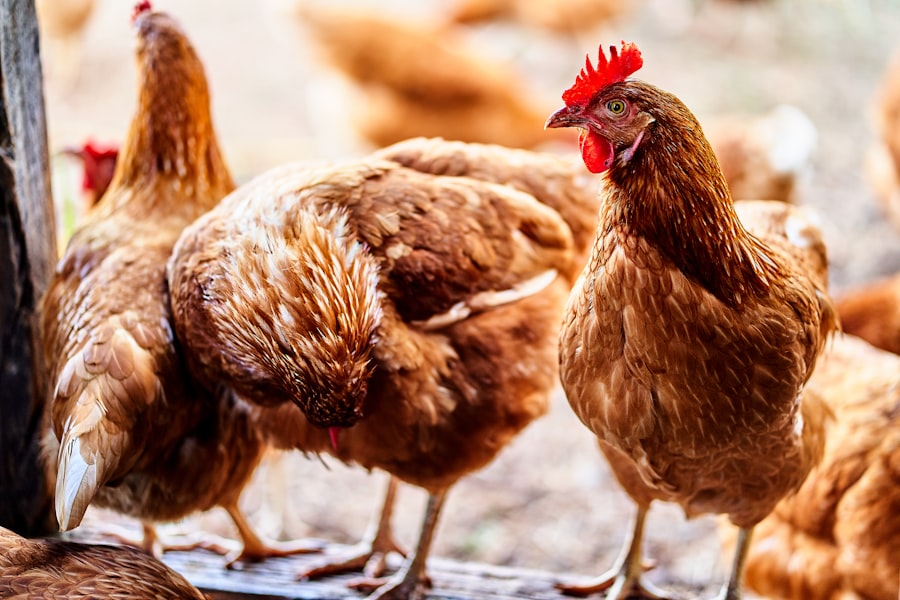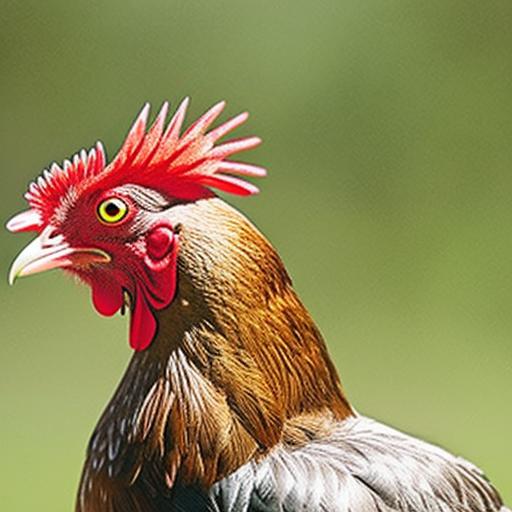Keeping chickens has a long history that dates back thousands of years. Chickens were first domesticated in Southeast Asia around 6000 BC and have since spread to every corner of the globe. Initially, chickens were primarily kept for their meat and eggs, but over time, they have become popular as pets and for their ornamental value as well.
There are several reasons why people choose to keep chickens. For some, it is a way to have a sustainable source of fresh eggs. Others enjoy the process of raising and caring for animals. Chickens also provide valuable fertilizer for gardens and can help control pests in the yard. Additionally, keeping chickens can be a great educational opportunity for children, teaching them about responsibility and the cycle of life.
Key Takeaways
- Keeping chickens has many benefits, including fresh eggs, natural pest control, and fertilizer for your garden.
- When choosing a breed of chicken, consider factors such as egg-laying ability, temperament, and climate adaptability.
- A well-designed chicken coop should provide adequate space, ventilation, and protection from predators.
- A chicken run should be secure and provide enough space for chickens to move around and forage.
- Proper feeding and watering, as well as regular cleaning and monitoring for signs of illness, are essential for the health and well-being of your chickens.
Benefits of keeping chickens
One of the main benefits of keeping chickens is having a constant supply of fresh eggs. Homegrown eggs are often considered to be superior in taste and quality compared to store-bought eggs. They are also more nutritious, as they contain higher levels of vitamins and omega-3 fatty acids.
Chickens also provide valuable fertilizer for gardens. Their droppings are rich in nitrogen, phosphorus, and potassium, which are essential nutrients for plant growth. By allowing chickens to roam freely in the garden or by using their droppings as compost, gardeners can improve soil fertility and promote healthy plant growth.
Another benefit of keeping chickens is pest control. Chickens are natural foragers and will eat a wide variety of insects, including slugs, snails, and even small rodents. By allowing chickens to roam freely in the yard or garden, they can help reduce pest populations naturally without the need for harmful chemicals.
Keeping chickens can also be a great educational opportunity for children. It teaches them about responsibility, compassion, and the cycle of life. Children can learn how to care for animals, collect eggs, and observe the hatching process. It can also be a great way for children to connect with nature and learn about where their food comes from.
Choosing the right breed of chicken
When choosing a breed of chicken, there are several factors to consider. First, you need to determine your purpose for keeping chickens. If you are primarily interested in egg production, then you will want to choose a breed that is known for its high egg-laying capabilities. If you are more interested in meat production, then you will want to choose a breed that grows quickly and has good meat quality.
Another factor to consider is the climate in which you live. Some breeds are better suited for cold climates, while others are better suited for hot climates. It is important to choose a breed that can tolerate the temperature extremes in your area.
For beginners, there are several popular breeds that are known for being easy to care for and friendly. Some popular choices include the Rhode Island Red, the Plymouth Rock, and the Sussex. These breeds are known for their docile temperament, good egg production, and hardiness.
When it comes to purchasing chickens, there are several options available. You can purchase chicks from a hatchery or farm supply store, or you can purchase adult chickens from a local breeder or farmer. It is important to choose healthy birds from reputable sources to ensure that you are starting with a strong and disease-free flock.
Setting up a chicken coop
A chicken coop is essential for keeping chickens safe and comfortable. When setting up a chicken coop, there are several factors to consider.
First, you need to choose a suitable location for the coop. It should be placed in an area that is well-drained and protected from strong winds and direct sunlight. The coop should also be located away from neighbors’ houses to minimize noise and odor concerns.
The size of the coop will depend on the number of chickens you plan to keep. As a general rule of thumb, each chicken should have at least 4 square feet of indoor space and 10 square feet of outdoor space in the run. This will ensure that they have enough room to move around and engage in natural behaviors.
When it comes to materials, there are several options available. Wood is a popular choice for its durability and insulation properties. Other options include metal and plastic, which are easier to clean but may not provide as much insulation.
There are also several coop design options to choose from. Some people prefer a traditional A-frame design, while others opt for a more modern and functional design. It is important to choose a design that is easy to clean and provides adequate ventilation and natural light.
Designing a chicken run
A chicken run is an enclosed outdoor area where chickens can roam freely and engage in natural behaviors. It is important to provide chickens with a run to ensure their safety and well-being.
The size of the run will depend on the number of chickens you have and the amount of space available. As mentioned earlier, each chicken should have at least 10 square feet of outdoor space in the run. It is also important to provide enough vertical space for chickens to stretch their wings and jump.
When choosing a location for the run, it should be placed in an area that is well-drained and protected from predators. It should also be easily accessible from the coop to allow chickens to move freely between the two areas.
When it comes to materials, there are several options available. Chicken wire is a popular choice for its affordability and effectiveness in keeping predators out. Other options include hardware cloth, which provides better protection against predators but is more expensive.
Feeding and watering chickens

Proper nutrition is essential for the health and well-being of chickens. When it comes to feeding chickens, there are several options available.
The most common type of feed for chickens is commercial chicken feed, which is formulated to provide all the necessary nutrients for optimal growth and egg production. There are different types of feed available, including starter feed for chicks, grower feed for young chickens, and layer feed for adult chickens.
In addition to commercial feed, chickens can also be fed a variety of kitchen scraps and garden waste. This can include fruits, vegetables, grains, and even meat scraps. It is important to avoid feeding chickens anything that is toxic to them, such as chocolate, onions, and avocado.
Chickens also require access to fresh water at all times. There are several watering options available, including traditional waterers and automatic waterers. It is important to clean and refill the waterers regularly to ensure that the water is clean and free from contaminants.
When it comes to how much to feed chickens and when, it is important to follow the recommendations on the feed packaging. Chickens should be fed a balanced diet that meets their nutritional needs. It is also important to provide enough feed for chickens to eat throughout the day, as they are natural foragers and prefer to eat small amounts frequently.
Health and hygiene of chickens
Keeping chickens healthy and maintaining good hygiene in the coop and run is essential for preventing diseases and ensuring the well-being of the flock.
There are several common health issues that can affect chickens, including respiratory infections, parasites, and egg-laying problems. It is important to be familiar with the signs of these health issues and take appropriate measures to prevent and treat them.
Preventing diseases starts with good hygiene practices. The coop and run should be cleaned regularly to remove droppings and other debris. This will help prevent the buildup of bacteria and parasites that can cause diseases.
Regular health checks are also important for identifying any potential health issues early on. This includes checking chickens for signs of illness or injury, as well as monitoring their egg production and behavior.
Egg production and collection
Chickens typically start laying eggs at around 5 to 6 months of age, although this can vary depending on the breed and individual chicken. Most chickens will lay eggs consistently for the first few years of their life, with egg production gradually declining as they get older.
Collecting and storing eggs properly is important to ensure their freshness and quality. Eggs should be collected daily to prevent them from getting dirty or damaged. They should be stored in a cool and dry place, preferably in a refrigerator, to prolong their shelf life.
If you have an excess of eggs, there are several things you can do with them. You can share them with friends and family, sell them at a local farmers market, or even start your own small egg business. You can also use them in cooking and baking or preserve them by pickling or freezing.
Dealing with predators
Predators can pose a threat to chickens, especially if they are allowed to roam freely. Common predators include raccoons, foxes, coyotes, and birds of prey.
There are several measures you can take to deter predators and protect your chickens. This includes securing the coop and run with sturdy fencing that is buried underground to prevent predators from digging under it. You can also install motion-activated lights or alarms to scare away predators.
If a predator does manage to attack your chickens, it is important to take immediate action to protect the rest of the flock. This may involve chasing away the predator or using deterrents such as noise makers or water sprays.
Legal considerations for keeping chickens
Before starting a chicken-keeping venture, it is important to familiarize yourself with the local laws and regulations regarding chicken keeping. Some areas have restrictions on the number of chickens you can keep or require permits for keeping chickens.
It is also important to consider noise and odor concerns when keeping chickens. Roosters can be noisy, especially in the early morning, so it is important to check if they are allowed in your area. Additionally, chicken droppings can produce odors, so it is important to manage waste properly and keep the coop and run clean.
Keeping chickens can be a rewarding and fulfilling experience. Not only do chickens provide a sustainable source of fresh eggs, but they also offer valuable fertilizer for gardens, help control pests, and provide educational opportunities for children. By choosing the right breed, setting up a suitable coop and run, providing proper nutrition and care, and taking necessary precautions against predators, you can enjoy the benefits of keeping chickens while ensuring their health and well-being. If you are interested in keeping chickens, there are plenty of resources available online and in books to help you get started.
If you’re interested in learning more about the basics of keeping chickens, you might also find this article on how to insulate a chicken coop helpful. Insulating your coop is essential for maintaining a comfortable and healthy environment for your feathered friends, especially during extreme weather conditions. Check out this informative guide on how to insulate a chicken coop to ensure your chickens stay cozy and protected all year round.
FAQs
What are the basic requirements for keeping chickens?
To keep chickens, you will need a coop or shelter, a secure outdoor area for them to roam, food and water, and bedding material. You will also need to provide them with regular care and attention.
What kind of shelter do chickens need?
Chickens need a shelter that is dry, draft-free, and well-ventilated. The shelter should be large enough to accommodate the number of chickens you have and should have roosting bars for them to sleep on.
What should I feed my chickens?
Chickens need a balanced diet that includes protein, carbohydrates, vitamins, and minerals. You can feed them commercial chicken feed or a mix of grains, seeds, and vegetables. They also need access to clean water at all times.
How often do I need to clean the coop?
You should clean the coop at least once a week, removing any soiled bedding and replacing it with fresh bedding. You should also clean the water and food containers regularly to prevent the spread of disease.
What kind of predators should I be aware of?
Chickens are vulnerable to predators such as foxes, raccoons, and hawks. You should ensure that your coop and outdoor area are secure and that your chickens are safely locked up at night.
How do I keep my chickens healthy?
To keep your chickens healthy, you should provide them with a clean and dry living environment, a balanced diet, and access to fresh water. You should also monitor them for signs of illness and seek veterinary care if necessary.
Meet Walter, the feathered-friend fanatic of Florida! Nestled in the sunshine state, Walter struts through life with his feathered companions, clucking his way to happiness. With a coop that’s fancier than a five-star hotel, he’s the Don Juan of the chicken world. When he’s not teaching his hens to do the cha-cha, you’ll find him in a heated debate with his prized rooster, Sir Clucks-a-Lot. Walter’s poultry passion is no yolk; he’s the sunny-side-up guy you never knew you needed in your flock of friends!







